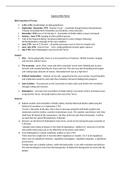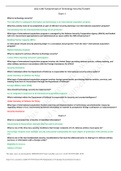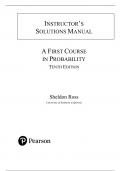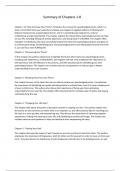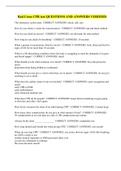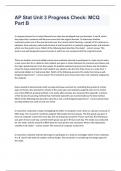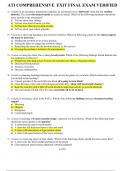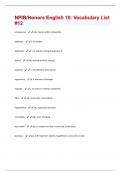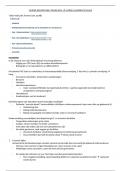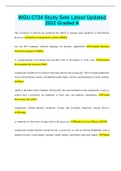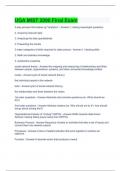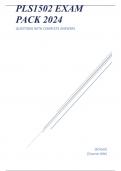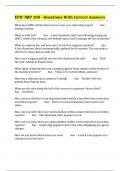Causes of the Terror
Brief overview of Terror:
1792- 1794: 40,000 killed (17,000 guillotined)
September- December 1793: ‘Popular Terror’ – hundreds brought before Revolutionary
Tribunal (including Marie Antoinette and Girodins), many executed
December 1793: Law of 14 Frimaire II –Committee of Public Safety’s power increased
January - June 1794: purging of other political groups
‘Cult of the Supreme Being’ introduced (attempt to control religion following
dechristianisation campaign of the sans-culottes)
June 1794: Law of 22 Prairial – all political prisoners sent to Paris for simple trials
June- July 1794: ‘Great Terror’ – Over 1,000 guillotined (mostly upper classes)
July 1794: Fall of Robespierre and end of the Terror
Causes:
1. War – Starts going badly, there is an increased fear of Austrian / British invasion, émigrés
and enemies within France.
2. The economy – grain, flour, meat and other essentials’ prices were inflating due to poor
harvests and causing hardship for many and riots. The war was also disrupting food supply
and costing large amounts of money. Unemployment was at a high level.
3. Political factionalism – Radicals on the left, supported by the sans-culottes, feared Royalists
and moderates would try and undo the revolution and were holding back progress.
4. Sans-Culottes – Put pressure on the Convention to take action and further the revolution
through rioting and marches.
5. Robespierre – Oversees the Committee of Public Safety’s increased control, introduces laws
to spread the Terror, his death leads to the end of the Terror
Sources:
1) Radical Jacobin and Committee of Public Safety member Bertrand Barère addressing the
National Convention on 5 September 1793:
“Terror is the order of the day. This is how to do away instantly with both royalists and
moderates and the restless, counter-revolutionary scum. The royalists want blood, well, they
shall have the blood of the conspirators, the likes of Brissot and Marie Antoinette. It will be
an operation for special Revolutionary Tribunals”
2) Buissart, an old friend of Robespierre from Arras, wrote to him during the grain scarcities of
1793 that:
“[people] were dying of hunger in the midst of abundance. I believe it is necessary to kill the
mercantile aristrocracy just as we killed that of the priests and nobles."
3) From Robespierre’s private notebook, written in June 1793:
There must be a single will. It must be either republican or royalist. For it to be republican,
there must be republican ministers, republican newspapers, republican deputies, a republican
government.
Foreign wars are a deadly sickness, while the body politic is sick with revolution and division.
The internal dangers come from the bourgeoisie; to defeat the bourgeoisie we must rally the
people.
Brief overview of Terror:
1792- 1794: 40,000 killed (17,000 guillotined)
September- December 1793: ‘Popular Terror’ – hundreds brought before Revolutionary
Tribunal (including Marie Antoinette and Girodins), many executed
December 1793: Law of 14 Frimaire II –Committee of Public Safety’s power increased
January - June 1794: purging of other political groups
‘Cult of the Supreme Being’ introduced (attempt to control religion following
dechristianisation campaign of the sans-culottes)
June 1794: Law of 22 Prairial – all political prisoners sent to Paris for simple trials
June- July 1794: ‘Great Terror’ – Over 1,000 guillotined (mostly upper classes)
July 1794: Fall of Robespierre and end of the Terror
Causes:
1. War – Starts going badly, there is an increased fear of Austrian / British invasion, émigrés
and enemies within France.
2. The economy – grain, flour, meat and other essentials’ prices were inflating due to poor
harvests and causing hardship for many and riots. The war was also disrupting food supply
and costing large amounts of money. Unemployment was at a high level.
3. Political factionalism – Radicals on the left, supported by the sans-culottes, feared Royalists
and moderates would try and undo the revolution and were holding back progress.
4. Sans-Culottes – Put pressure on the Convention to take action and further the revolution
through rioting and marches.
5. Robespierre – Oversees the Committee of Public Safety’s increased control, introduces laws
to spread the Terror, his death leads to the end of the Terror
Sources:
1) Radical Jacobin and Committee of Public Safety member Bertrand Barère addressing the
National Convention on 5 September 1793:
“Terror is the order of the day. This is how to do away instantly with both royalists and
moderates and the restless, counter-revolutionary scum. The royalists want blood, well, they
shall have the blood of the conspirators, the likes of Brissot and Marie Antoinette. It will be
an operation for special Revolutionary Tribunals”
2) Buissart, an old friend of Robespierre from Arras, wrote to him during the grain scarcities of
1793 that:
“[people] were dying of hunger in the midst of abundance. I believe it is necessary to kill the
mercantile aristrocracy just as we killed that of the priests and nobles."
3) From Robespierre’s private notebook, written in June 1793:
There must be a single will. It must be either republican or royalist. For it to be republican,
there must be republican ministers, republican newspapers, republican deputies, a republican
government.
Foreign wars are a deadly sickness, while the body politic is sick with revolution and division.
The internal dangers come from the bourgeoisie; to defeat the bourgeoisie we must rally the
people.

